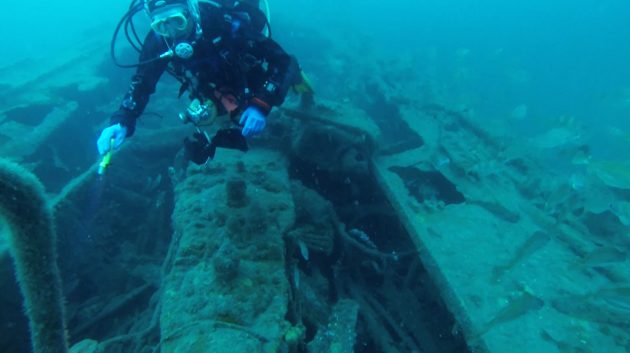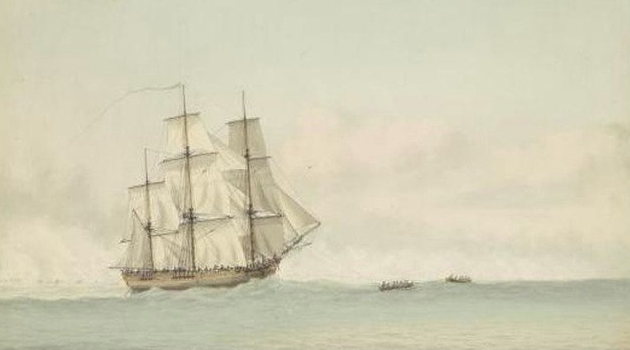Lying undiscovered for a century, a rare WW1 trawler and minesweeper, Arfon, has now been given special protection to preserve the vessel for future generations.
Arfon was first discovered off the Dorset coast in 2014.
The rare steam fishing trawler, which was fitted out as a minesweeper for the Royal Navy during the First World War, has now been given special protection by the Government.

A drawing of the wreck of the Arfon. Copyright Swanage Boat Charters Ltd
The Department for Culture Media and Sport took the advice of Historic England as the wreck is considered to be ‘at risk’ from uncontrolled salvage.
The Arfon was built in 1908 in Goole, East Riding of Yorkshire.
It worked out of Portland Harbour Naval Base during the First World War, sweeping mines laid by German U-boats along the inshore shipping lanes off the Dorset coast for three years before striking a mine in April 1917.
It rapidly sank with the loss of 10 of the crew of 13.

Mine damage on the Arfon. Copyright Swanage Boat Charters Ltd
The Arfon is exceptionally well preserved with the trawler’s key features such as its mine-sweeping gear, deck gun, portholes and engine room still intact on the seabed off St Alban’s Head.
Most of the wrecks around England’s coast that date from this period have been salvaged for their fixtures and fittings.
The Arfon is unique in that it was untouched for 100 years, until it was first dived in 2014.
It is considered to be vulnerable to souvenir hunters and uncontrolled salvage.

A gun from the wreck of the Arfon. Copyright Swanage Boat Charters Ltd
The head of listing programmes at Historic England, Joe Flatman, said: “The Arfon shipwreck is a rare survivor of a type of vessel once very common around the coastline of Britain but which has now entirely disappeared, surviving only in documents and as wrecks like this one.”
“Trawlers, minesweepers and other coastal patrol vessels played a crucial role in keeping the sea lanes around the British Isles open during both World Wars, a part of the war effort that is often overlooked,” he explained.

The main winch on the wreck of the Arfon. Copyright Swanage Boat Charters Ltd
“The crews who served aboard such vessels faced tremendous dangers with unstinting bravery and devotion to duty. Historic England is proud to help tell part of this hidden story of naval endeavour during the First World War as part of our work,” stated Flatman.
The finders of the wreck, Martin and Bryan Jones, who run a family dive charter business, are now working to secure preservation of this important site.

The brass lubricator from the wreck of the Arfon next to a pristine ship’s lubricator. Copyright Swanage Boat Charters Ltd
Martin Jones said: “We are delighted to be working with Historic England to protect and investigate the Arfon and we’re planning a special commemoration to mark the centenary of its sinking next April.”
The Arfon is protected under the Protection of Wrecks Act 1973, which means that access to the site is restricted only to divers who have been granted a licence from Historic England.
Video: Wreck of the Washington discovered
Three shipwreck explorers have uncovered the wreck of the sloop, Washington, in Lake Ontario off the shores of Oswego, New…
Researchers believe they’ve found Captain Cook’s Endeavour
The Rhode Island Marine Archaeology Project says it has now narrowed down the search for HMS Endeavour to a group…
Shipwrecked gold discovered off Wales
Vincent Thurkettle has discovered Britain's biggest gold nugget - worth £50,000 - close to the shipwreck of The Royal Charter…
Video: Maiden voyage for the diving robot, OceanOne
Stanford University's humanoid diving robot has just finished its maiden dive off the coast of France, exploring a 17th century…







